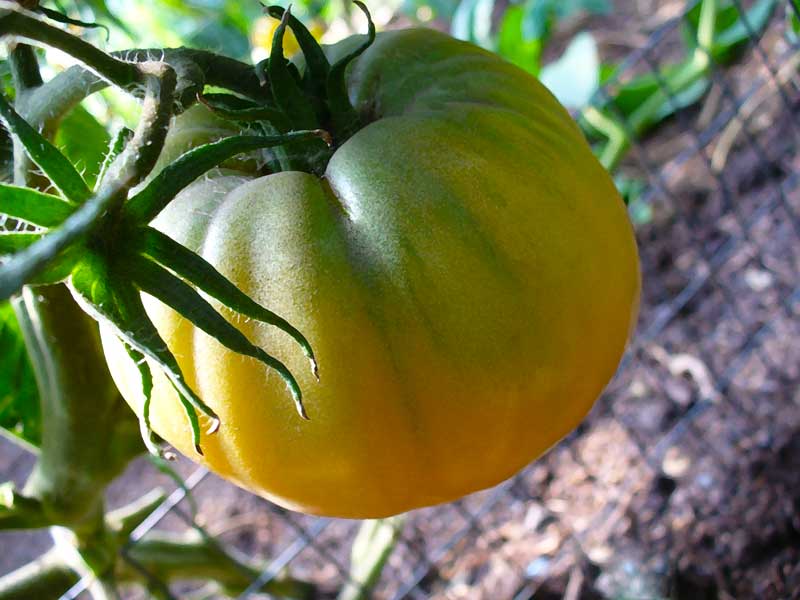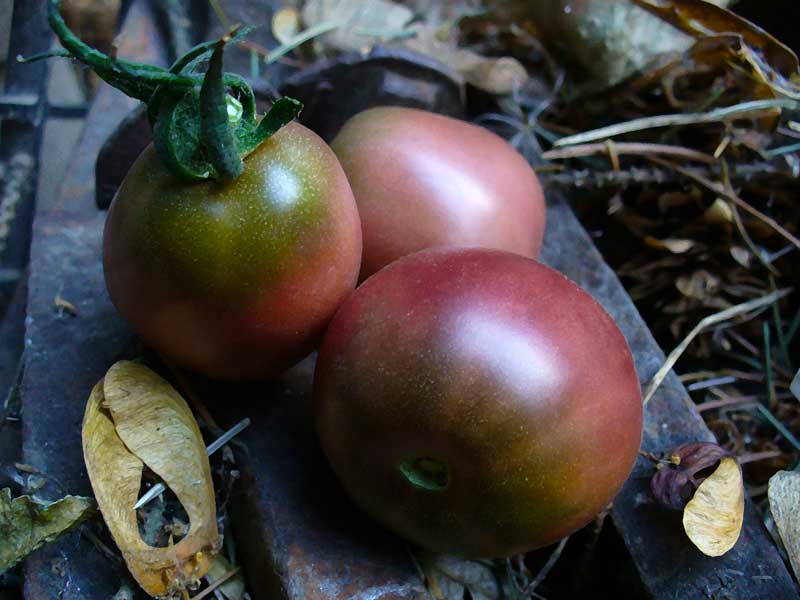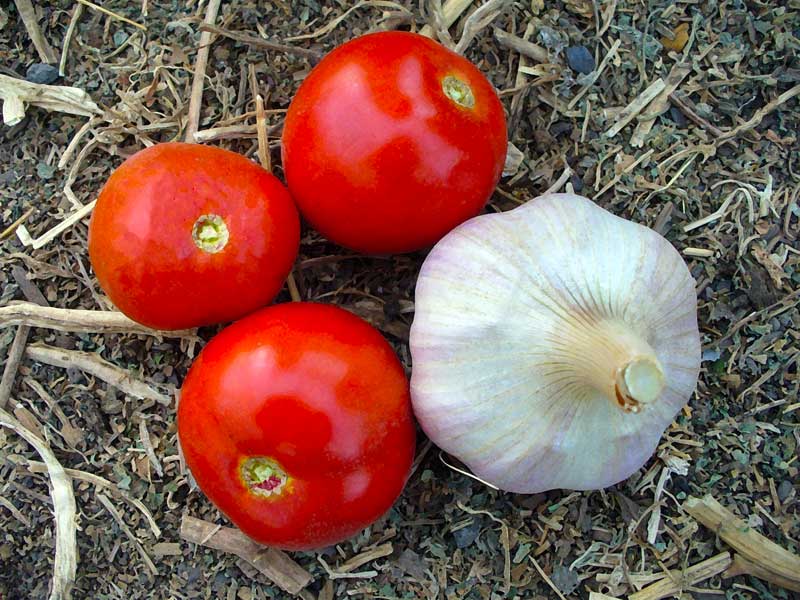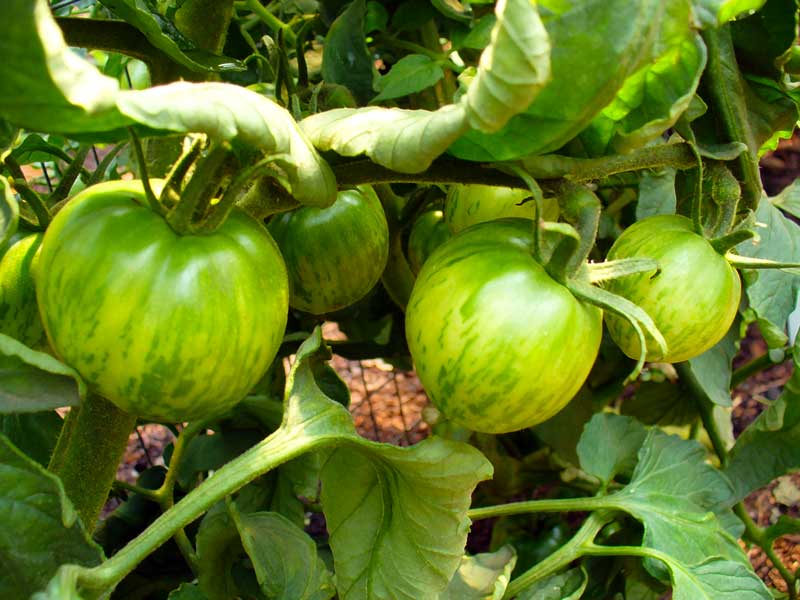Why Commercial Tomatoes Taste Bland
Tasteless, bland and insipid are some terms I've heard used to describe supermarket tomatoes. Why do these beautiful red fruits taste so bland? The answer is in their genetics.
 Commercial tomatoes are selected for uniform ripening. Unripe commercial tomatoes are a light green color that turns into a uniform red. Conversely, heirloom tomatoes, like the yellow Summer Cider shown, often have dark green coloration near the stem even when the fruit is fully ripe. This top area of the tomato is known as the shoulders. Green shoulders make it harder to tell when the fruit is ripe and ready to pick.
Commercial tomatoes are selected for uniform ripening. Unripe commercial tomatoes are a light green color that turns into a uniform red. Conversely, heirloom tomatoes, like the yellow Summer Cider shown, often have dark green coloration near the stem even when the fruit is fully ripe. This top area of the tomato is known as the shoulders. Green shoulders make it harder to tell when the fruit is ripe and ready to pick.
Dissatisfied by green shoulders, tomato breeders cheered when a mutation that provided uniform ripening appeared. This miraculous tomato, dubbed 'Allred' was released from North Dakota State University Agricultural Experimental Station in 1937. Allred tomatoes ripened to a bright uniform red with no green shoulders. This trait was called the 'uniform ripening' trait. It was quickly incorporated into all commercial tomatoes.
Unfortunately there is a dark downside to these perfectly red tomatoes. The so called 'uniform ripening' trait avoided green shoulders by turning off a tomato gene, SIGLK2. SIGLK2 increases chloroplast production in the tomato plant and fruit (Powell et al. 2012, Nadakuduti et al. 2014, Nguyen et al. 2014). Chloroplasts make energy through photosynthesis. They also turn tomato fruit a darker green.
 Wild type or heirloom tomatoes, such as the three green shouldered Psamathe tomatoes shown, use the energy from their chloroplasts to make sweet sugars and tasty carotenoids. Heirloom tomatoes receive 25% of their sugars from the chloroplasts in the fruits and 75% from leaves. Green shoulders on tomatoes are actually an visual indicator that the tomato has more carbohydrates and more flavor. By breeding out the green, growers were breeding out the flavor.
Wild type or heirloom tomatoes, such as the three green shouldered Psamathe tomatoes shown, use the energy from their chloroplasts to make sweet sugars and tasty carotenoids. Heirloom tomatoes receive 25% of their sugars from the chloroplasts in the fruits and 75% from leaves. Green shoulders on tomatoes are actually an visual indicator that the tomato has more carbohydrates and more flavor. By breeding out the green, growers were breeding out the flavor.
 In contrast, modern commercial tomatoes, such as the three bright red beauties shown hobnobbing with a garlic, receive no sugar from the fruit. The 'uniform ripening' mutation disables genes, such as SIGLK2, that enable fruit energy production. Thus, these mutated tomatoes are unable to make their own sugar and produce less carotenoids than natural tomatoes. Commercial tomato fruits only receive sugar from the leaves. They have less carbohydrates, less carotenoids and less flavor. But they look prettier.
In contrast, modern commercial tomatoes, such as the three bright red beauties shown hobnobbing with a garlic, receive no sugar from the fruit. The 'uniform ripening' mutation disables genes, such as SIGLK2, that enable fruit energy production. Thus, these mutated tomatoes are unable to make their own sugar and produce less carotenoids than natural tomatoes. Commercial tomato fruits only receive sugar from the leaves. They have less carbohydrates, less carotenoids and less flavor. But they look prettier.
How does this work?
Chloroplasts enable photosynthesis. Photosynthesis uses the energy from light along with water and carbon dioxide to make energy and building compounds.
Chloroplasts increase chlorophyll concentration in the plant. Chloroplasts are also a beautiful pure green color. Extra chlorophyll turns tomato fruit darker green as it gives them more energy. Greener tomatoes have a higher concentration of flavor creating sugars and healthy carotenoids, such as lycopene.
 There are two genes responsible for chloroplast accumulation and distribution in the tomato plant, SIGMLK1 and SIGMLK2. The 'uniform ripening' tomatoes lost one of those genes, SIGMLK2. SIGMLK2 codes for chloroplasts in the fruit and the leaves. The remaining gene, SIGMLK1, only codes for chloroplasts in the plant leaves not the fruit. This means that commercial tomatoes only obtain energy from the leaves.
There are two genes responsible for chloroplast accumulation and distribution in the tomato plant, SIGMLK1 and SIGMLK2. The 'uniform ripening' tomatoes lost one of those genes, SIGMLK2. SIGMLK2 codes for chloroplasts in the fruit and the leaves. The remaining gene, SIGMLK1, only codes for chloroplasts in the plant leaves not the fruit. This means that commercial tomatoes only obtain energy from the leaves.
Although genetics play the main role in bland tasting tomatoes other factors can also contribute. Commercial tomatoes are picked green and stored in the dark. These green tomatoes are gassed with ethylene to develop red coloration and ripening. Vine ripened tomatoes develop more sugars and thus more flavor.
In addition, many commercial varieties have a tough skin to resist bruising while in transport and storage. This can make chewing on the tomato like eating a piece of rubber.
Lastly, commercial tomatoes are usually refrigerated which damages fruit flavor and texture.
References:
- Carnesecchi S, Schneider Y, Ceraline J, Duranton B, Gosse F, Seiler N, Raul F. Geraniol, a component of plant essential oils, inhibits growth and polyamine biosynthesis in human colon cancer cells. J Pharmacol Exp Ther. 2001;298:197-200. Pubmed.
- Nadakuduti SS, Holdsworth WL, Klein CL, Barry CS. KNOX genes influence a gradient of fruit chloroplast development through regulation of GOLDEN2-LIKE expression in tomato. Plant J. 2014;78:1022-33. Pubmed. doi: 10.1111/tpj.12529.
- Nguyen CV, Vrebalov JT, Gapper NE, Zheng Y, Zhong S, Fei Z, Giovannoni JJ. Tomato GOLDEN2-LIKE transcription factors reveal molecular gradients that function during fruit development and ripening. Plant Cell. 2014;26:585-601. Pubmed. doi: 10.1105/tpc.113.118794.
- Powell ALT, Nguyen CV, Hill T, Cheng KL, Figueroa-Balderas R, Aktas H, Ashrafi H, Pons C, Fernández-Muñoz R, Vicente A, Lopez-Baltazar J, Barry CS, Liu Y, Chetelat R, Granell A, Van Deynze A, Giovannoni JJ, Bennett AB. Uniform ripening Encodes a Golden 2-like Transcription Factor Regulating Tomato Fruit Chloroplast Development. Science. 2012; 29; 336(6089):711-1715. Full paper. doi:10.1126/science.1222218
- Tieman D, Bliss P, McIntyre LM, Blandon-Ubeda A, Bies D, Odabasi AZ, Rodríguez GR, van der Knaap E, Taylor MG, Goulet C, Mageroy MH, Snyder DJ, Colquhoun T, Moskowitz H, Clark DG, Sims C, Bartoshuk L, Klee HJ. The Chemical Interactions Underlying Tomato Flavor Preferences. Current Biology, 2012; 22:1035-9. Pubmed. doi: 10.1016/j.cub.2012.04.016
